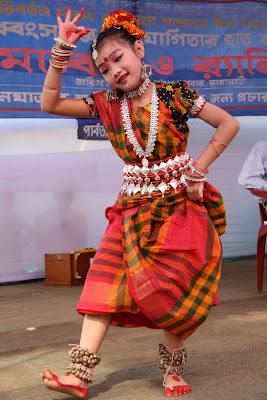 They may not have heard the term "climate change", but these women workers - including those who try to make a living from breaking bricks to garment workers - who turned up at a rally in Dhaka, know all too well how changing weather patterns have been affecting their lives and those of millions of others in Bangladesh.
They may not have heard the term "climate change", but these women workers - including those who try to make a living from breaking bricks to garment workers - who turned up at a rally in Dhaka, know all too well how changing weather patterns have been affecting their lives and those of millions of others in Bangladesh. They donned masks representing leaders of the world's top industrialised countries - the G8 - and chanted out slogans “Protect our agriculture, protect our country, protect our lives from the damaging effects of climate change”.
They donned masks representing leaders of the world's top industrialised countries - the G8 - and chanted out slogans “Protect our agriculture, protect our country, protect our lives from the damaging effects of climate change”.In the last few years Bangladesh has seen an increase in the intensity and frequency of climate-related problems. But changing temperatures and patterns have meant that weather-related disasters have become less predictable and harder to manage. And that makes it harder for the poorest communities to prepare or respond to increased hazards.

 “It is no exaggeration to say that Bangladesh will eventually become one of the most vulnerable countries on earth because of the implications of climate change”, said climate change expert, Ahsan Uddin Ahmed, of the Centre for Global Change, one of the speakers at the Dhaka event.
“It is no exaggeration to say that Bangladesh will eventually become one of the most vulnerable countries on earth because of the implications of climate change”, said climate change expert, Ahsan Uddin Ahmed, of the Centre for Global Change, one of the speakers at the Dhaka event.
“The magnitude of the problem is enormous. Not only for Bangladesh, but all the people affected by climate change, it’s a clear message: unless the world leaders decide to stop emissions now, many people around the world will become climate victims and climate refugees, this is unacceptable to us.
“The need for adaptation and adaptation financing is increasing day by day”, he warned.
 Some of the indigenous women taking part in the rally and meeting
Some of the indigenous women taking part in the rally and meeting



















 These people were asking for government help in Jessore and Shatkira districts in south-western Bangladesh.
These people were asking for government help in Jessore and Shatkira districts in south-western Bangladesh. 